(Here's a link to the Google video)
Susan: What matters to God is not our sexual orientation, but our theological orientation.
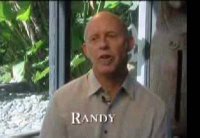
Randy: I think the baptismal covenant is the basis for that whole theology. Nowhere in that covenant is there a question asked of the adult or the child or the baby, "Are you gay or are you straight?" When you're baptized, you're baptized into the fullness of the church, all of its rites and its ceremonies, privileges, and its obligations.
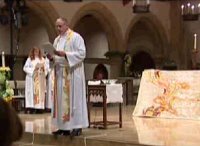
Celebrant: Will you strive for justice and peace among all people, and respect the dignity of every human being?
Congregation: I will, with God's help.
Randy: I remember at General Convention, when women were being voted on for ordaination, there was a button that people were wearing that said, "Ordain women or stop baptizing them." And I think that's a great model for all of this.
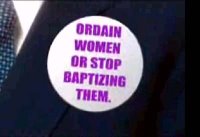
Wilma: One of the many issues in South Africa around the ordaination of women was, people would say to me, "But the Bible says--". "The Bible says that women can't be priests. So I had to do a lot of work about the Scripture in general--does the Bible *really* say that? And if it looks like it's saying that, is that what it really says, or is it saying something else?
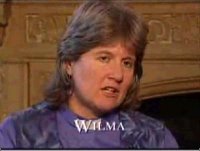
So I'd kind of done that journey, and I was really really helped in my journey around women priests. And over the years I've come to see that it's quite an important comparison to make that when we later, after the whole women priests thing went through in South Africa, it's like the next issue that came our way, was in fact the issue of gay and lesbian people within the church. And people would cite the very same arguements that they had said to me, the reasons why they said "You can't be a priest because" --they went from issues of culture to practicality, to "the Bible says", "church hasn't", "it will divide the church". I mean, the very same issues! And I just couldn't ignore the fact that then they're saying, for the very same reasons, gay or lesbian can't be joined in union, can't be ordained and so on, I'm saying, hang on, let's take a look at this. If you or I have moved to a point that we agree with women priests, and say yes, women are fully equal and able to be ordained, and so on, well then you've done something with the scriptures, you've done something with your arguments. You've traveled a journey that, if you're going to be consistent, you have to end up supporting gay and lesbian people, and full equality and inclusion of gay and lesbian people in the church.
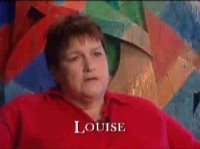
Louise: It's important for gay and lesbian people to tell our stories, to come out of the closet, to be open about who we are, because then people get to know us. And once they get to know, and put a face to the issue, it's not an issue any more. It becomes a person, and they can become supportive of a person. And if a person wants to have their relationship supported, then it's much easier for people to say, "Okay, I can support Mary and Jane in their relationship" or "I can support Joe and Jim" as opposed to say "I don't know how I feel about gay marriage". So it's important always to put a face on the issue.
------------------------------
On a related note, there was an article in The Other Paper this week about the factors that have allowed a midwestern city like Columbus, in the middle of a so-called "red state" to become so "gay friendly". It's worth a read--just make sure you read it before Thursday because that's when the alternative newsweekly releases its next edition, and that article will be replaced with a different cover story.
Alternate link for comments |
![]()

![]()
|